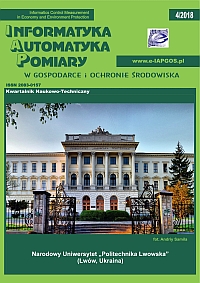METHOD OF SAFE LANDING THE EMERGENCY QUADROCOPTER
Article Sidebar
Issue Vol. 8 No. 4 (2018)
-
THE SOURCES OF RADIATION IN THE SHORT-WAVE RANGE ON THE BASIS OF II-VI HETEROLAYERS
Mikhail Slyotov, Alexey Slyotov4-7
-
ANALYSIS OF THE SEPARATION METHODS OF OPTICAL SPECTRA FOR INDIVIDUAL COMPONENTS
Viktor Makhniy, Oksana Kinzerska, Illia Senko8-11
-
FEATURES OF THE MANAGEMENT OF DATA ENCRYPTION KEYS IN THE CLOUD STORAGE MS SQL AZURE
Olexander Beley12-15
-
MULTICRITERIA SELECTION OF THE OPTIMAL DESIGN OPTIONS OF TELECOMMUNICATION FACILITIES
Valeriy Bezruk, Daria Chebotareva, Yulia Skoryk16-19
-
DEVELOPMENT OF THE METHOD OF INDIRECT STEGANOGRAPHIC DATA HIDING IN THE CONTAINER IMAGE CONTOUR
Volodymyr Barannik, Oleg Shatun, Dmitriy Barannik, Veronika Kobtseva20-23
-
STEGANOGRAPHY METHODS USED IN ATTACKS ON INFORMATION AND COMMUNICATION SYSTEMS
Anna Romanova, Sergiy Toliupa24-27
-
BUILDING INTRUSION DETECTION SYSTEMS BASED ON THE BASIS OF METHODS OF INTELLECTUAL ANALYSIS OF DATA
Serhii Toliupa, Mykola Brailovskyi, Ivan Parkhomenko28-31
-
OVERVIEW OF APPLICATIONS OF WIRE MEDIUM IN RADIO ENGINEERING MEANS
Mykola Khobzei, Dmytro Vovchuk, Magdalena Michalska32-35
-
IMPROVEMENT OF FIDELITY OF MOVING OBJECTS CLASSIFICATION IN GUARD SIGNALING COMPLEXES WITH SEISMIC SENSORS
Bohdan Volochiy, Mykhailo Zmysnyi, Leonid Ozirkovskyy, Volodymyr Onyshchenko, Yuriy Salnyk36-39
-
DEVELOPMENT OF THE REMOTE-PILOTED VEHICLE ALGORITHMIC SUPPORT AND ON-BOARD NAVIGATION COMPLEX STRUCTURE
Mykola Mykyjchuk, Volodymyr Markiv40-43
-
METHOD OF SAFE LANDING THE EMERGENCY QUADROCOPTER
Bohdan Blagitko, Yuriy Mochulsky44-47
-
IMPROVEMENT OF METHODS OF MOTION COMPENSATION OF DYNAMIC OBJECTS MOVING IN VIDEO STREAM OF THE VIDEOCONFERENCING SYSTEM
Volodymyr Barannik, Mykola Dvorsky, Valeriy Barannik, Viktoria Himenko, Anton Sorokun48-51
-
INFORMATION SYSTEM FOR ASSESSING THE PROFESSIONAL ACTIVITIES COMPLEXITY – THEORETICAL AND PRACTICAL ASPECTS OF IMPLEMENTATION
Oleg Zaritskyi52-55
-
SUN TRANSITS IN GEO SATELLITE SYSTEMS IN THE ASPECT OF RADIO WAVES PROPAGATION
Jacek Łukasz Wilk-Jakubowski56-59
-
INFLUENCE OF MOBILE ROBOT CONTROL ALGORITHMS ON THE PROCESS OF AVOIDING OBSTACLES
Piotr Wójcicki, Paweł Powroźnik, Kamil Żyła, Stanisław Grzegórski60-63
-
MODIFICATIONS OF MAXIMUM POWER POINT TRACKING P&O METHOD FOR PHOTOVOLTAIC PANEL
Piotr Kozierski, Adam Owczarkowski, Marcin Lis, Dariusz Horla64-67
Archives
-
Vol. 10 No. 4
2020-12-20 16
-
Vol. 10 No. 3
2020-09-30 22
-
Vol. 10 No. 2
2020-06-30 16
-
Vol. 10 No. 1
2020-03-30 19
-
Vol. 9 No. 4
2019-12-16 20
-
Vol. 9 No. 3
2019-09-26 20
-
Vol. 9 No. 2
2019-06-21 16
-
Vol. 9 No. 1
2019-03-03 13
-
Vol. 8 No. 4
2018-12-16 16
-
Vol. 8 No. 3
2018-09-25 16
-
Vol. 8 No. 2
2018-05-30 18
-
Vol. 8 No. 1
2018-02-28 18
-
Vol. 7 No. 4
2017-12-21 23
-
Vol. 7 No. 3
2017-09-30 24
-
Vol. 7 No. 2
2017-06-30 27
-
Vol. 7 No. 1
2017-03-03 33
-
Vol. 6 No. 4
2016-12-22 16
-
Vol. 6 No. 3
2016-08-08 18
-
Vol. 6 No. 2
2016-05-10 16
-
Vol. 6 No. 1
2016-02-04 16
Main Article Content
DOI
Authors
Abstract
By means of mathematical modelling, the main features of emergency landing of quadrocopter are determined. The results of simulate landings of the quadrocopter in cases of failure of one of four pairs of electric motor screw are given. The methods of safe landing of an unmanned quadrocopter in case of failure of one of four pairs of motor-screw are proposed. The basis of the proposed methods is to use a parachuting effect. Parachuting achieved by forced off the power of the motor, which is located at the opposite end of the same yoke as faulty motor. As a result, the vertical speed of the quadrocopter at the time of landing significantly decreases in comparison with the speed of free fall.
Keywords:
References
Blagitko B., Mochulsky Y.: Emergency landing of quadrocopter in unmanned flight. Electronics and Information Technologies 8/2017, 137–142.
Blagitko B., Mochulsky Y.: Mathematical modeling of quadrocopter stabilization in flight. Electronics and Information Technologies 3/2013, 96–107.
Blagitko B., Zaiachuk I., Kit L., Mochulsky Y.: Modeling of the process of control of vertical take-off and landing of unmanned quadrocopter. Physical-mathematical modeling and information technologies 2/2012, 111–117.
Blagitko B., Zaiachuk I., Mochulsky Y.: Mathematical modeling of the effect of sensor features on the flight process of an unmanned quadrocopter. Physical-mathematical modeling and information technologies 21/2015, 22–29.
Huang H., Hoffmann G. M., Waslander S. L., Tomlin C. J.: Aerodynamics and control of autonomous quadrotor helicopters in aggressive maneuvering. IEEE International Conference on Robotics and Automation, May 2009, 3277–3282.
Marcelo B.,.Sampaio R.C.B, Bounabdallah S., Perrot V., Siegwart R.: In-Flight Collision Avoidance Controller Based Only on OS4 Embedded Sensors. Journal of the Brazilian Society of Mechanical Sciences and Engineering XXXIV(3)/2012, 294–107.
Mochulsky Y.: Matlab In Physical Research: tutor. – method. manual. VTS LNU them. Ivan Franko, Lviv 2004.
Nartin P., Salaun E.: The True Role of Accelerometer Feedback in Quadrotor Control. IEEE International Conference on Robotics and Automation, Anchorage, May 2010, 1623–1629.
Wissiere D., Bristeau P.-J., Martin A., Petit N.: Experimental autonomous flight of a small-scaled helicopter using accurate dynamics model and low-cost sensors. Proceeding of the 17th Word Congress The International Federation of Automatic Control. Seoul Korea 2008, 14642–14650.
Article Details
Abstract views: 390
License

This work is licensed under a Creative Commons Attribution-ShareAlike 4.0 International License.






